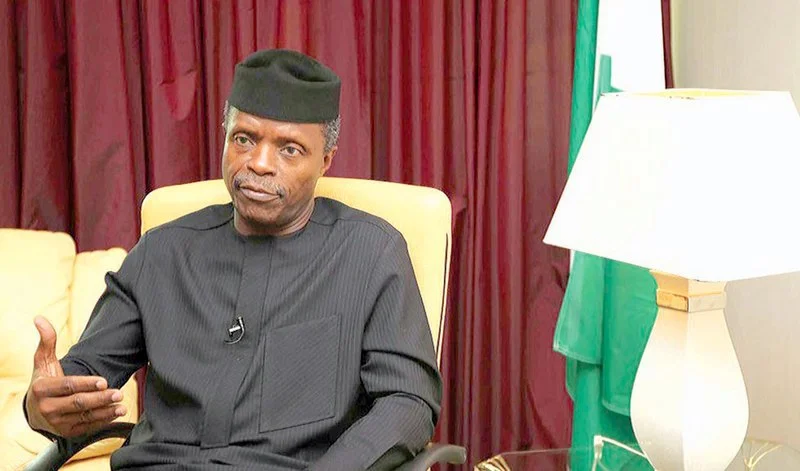Vice President Yemi Osinbajo says there is need for synergy between the African Court on Human and Peoples’ Rights and the Supreme Courts of member states.
Osinbajo was the special guest of honour and keynote speaker at inaugural session of the 2022 African Court of Human and Peoples’ Rights attended by leaders from across the continent and beyond on Monday in Arusha, Tanzania.
The theme of the event is: “The African Court and the Africa we want”.
The vice president proposed that the court after its own ruling, should make some recommendations for the consideration of the Supreme Courts of member states.
Osinbajo said, however, that by extant constituted documents of the court and the AU Charter, the court was not in position to adopt the proposal but amendments could be made in that regard.
He expressed concerns that the gains of democracy in the continent might be reversed by the recent coups d’états in Mali, Chad, Guinea, Sudan, and Burkina Faso and the attempted coup in Guinea Bissau.
“The AU has made it clear that unconstitutional changes of government will not be a part and cannot be a part of the Africa we want.
“It is refreshing that the African Court is keenly aware of this imperative; in the case of Association for Peace and Human Rights and Cote d’Ivoire, the court held that the African Charter on Democracy forms part of the African human right purpose for which it has jurisdiction to interpret and apply .
“And I respectfully urge the court to reinforce these emerging norms whenever it has the opportunity to interpret the charter and related instruments.
“And also to stress the necessity for good governance as a safeguard against undemocratic and unconstitutional upheavals in African states.”

Osinbajo said that every organ of international and national societies must work in solidarity to protect democracy and advance good governance.
He said the continent was proud of the African Court and its achievements in particular, the afrocentric development of human rights jurisprudence.
The vice president said that several challenges remained including the attitude of member states to the court.
“From its ‘Concept Note’, the Court has identified three such challenges.
“The first is the number of state parties to the Ouagadougou Protocol—32 ratifications in more than 20 years; the second is the fewer number of Article 34(6) Declarations, which permit direct access to the court by individuals and non-governmental organisations (NGOs).
“Only eight of the 32 state parties have done so; and four countries that made the declaration earlier—have withdrawn theirs.
“The third challenge is the lack of a proper enforcement mechanism, either at the domestic or continental level, notwithstanding the Ouagadougou Protocol’s mandate on the AU Executive Council.
“Other challenges include the reluctance of some states to respect the court’s orders of interim measures, not to mention funding problems in the face of competing financial needs within the AU system.”
He described it as worrisome the kind of enthusiasm displayed by member states after adopting the African Charter and it appeared to be lacking with respect to the Ouagadougou Protocol.
The vice president queried if states were fatigued after only four decades of experiment in regional human rights protection?
“There might be a need for further interaction between the court and member states and of the AU and civil society on how to work through these issues.
“The general reluctance of states to concede sovereignty is not peculiar to African states. But it is possible to be more creative about complementarity for example.
“We could consider the possibility of and I make these submissions, recognising very clearly that going by the presented constituted documents of the court and AU Charter, we are not in a position to effect what I am proposing.
“But I believe that by way of amendment, we may be to at least experiment with some thinking out of the box on complementarity.
“We could, for instance, consider the possibility of the court, after its own ruling, making some recommendations for the consideration of the Supreme Courts of member states; this would of course, involve further reflections and amendments to constitutive documents where necessary.”
He said that the point being made was that it should be possible to change tactics from time to time while keeping the strategy.
Osinbajo said that the African Court, African Commission, and African Committee, on their parts, should cooperate with one another in the true spirit of complementarity, rather than working at cross-purposes.
“If they do, they will send strong signals to states that a threefold cord is not easily broken.
“Civil society must continue to defend human rights and monitor governance particularly at the national levels where they matter most. The effectiveness of the human rights system depends, ultimately, on the willingness of all stakeholders to perform their respective roles.
“I strongly believe that Africa will overcome its current governance and human rights challenges; the African Court is a work in progress, being a young institution, it needs tending and nurturing,” he said.
The official opening of the court’s 2022 judicial year was performed by its President, Justice Imani Aboud.
The Nigerian High Commissioner to Tanzania, Dr Hamisu Takalmawa and Tanzania President, Samia Hassan, represented by the Prime Minister, Kassim Majaliwa, were among other notable speakers at the event. (NAN)





2 Comments